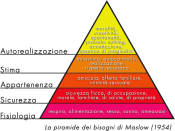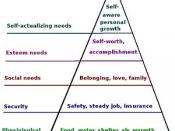Motivation and Performance Theories in Relation to New Zealand Post "B-12, G-47, I-24, O-51, I-5, N-36????.?BINGO?!!!!!!" A simple game of bingo, if analysed closely, can be shown to be a tedious task consisting of a repetitive action that occurs after being prompted by a repetitive stimulus. The skill level needed to make that action is low, and the variability in the rules of the game rarely changes. This game is not unlike many of the jobs that can be classified as having low motivational performance. So why do people not only enjoy playing games like bingo, but actually pay money to have the pleasure? The answer directly points to the motivating factors of monetary rewards, which is the stimulus for the individual?s performance. In this essay I will discuss the theory behind ?Motivation? and ?Performance? in relation to New Zealand Post and the theoretical ideals that their management should adopt with employees.
There are many theories regarding motivation with the most prevalent being the theories of Abraham Maslow and Frederick Herzberg. It is important to understand these theories and their implications to accurately comment on reinforcement theories of motivation. According to Maslow?s hierarchy of needs, there are five classes: (1) physiological, (2) safety, (3) social, (4) esteem, and (5) self-actualisation. (Karen. P. Harlos Lecture Notes) each lower level need must be satisfied before an individual experiences higher level needs. Also, as Hall, Batley, Elkin, Geare, Johnston, Jones, Selsky and Sibbald (1999) found that Maslow hypothesized that as physiological, safety, social, and esteem needs were satisfied, they ceased to motivate, while the self-actualisation needs actually motivate an individual more as they are satisfied (Hall et al. 1999).
Herzberg used this theory as a base to build his motivation-hygiene theory, which ties Maslow?s needs to on the job achievement. The hygiene...


